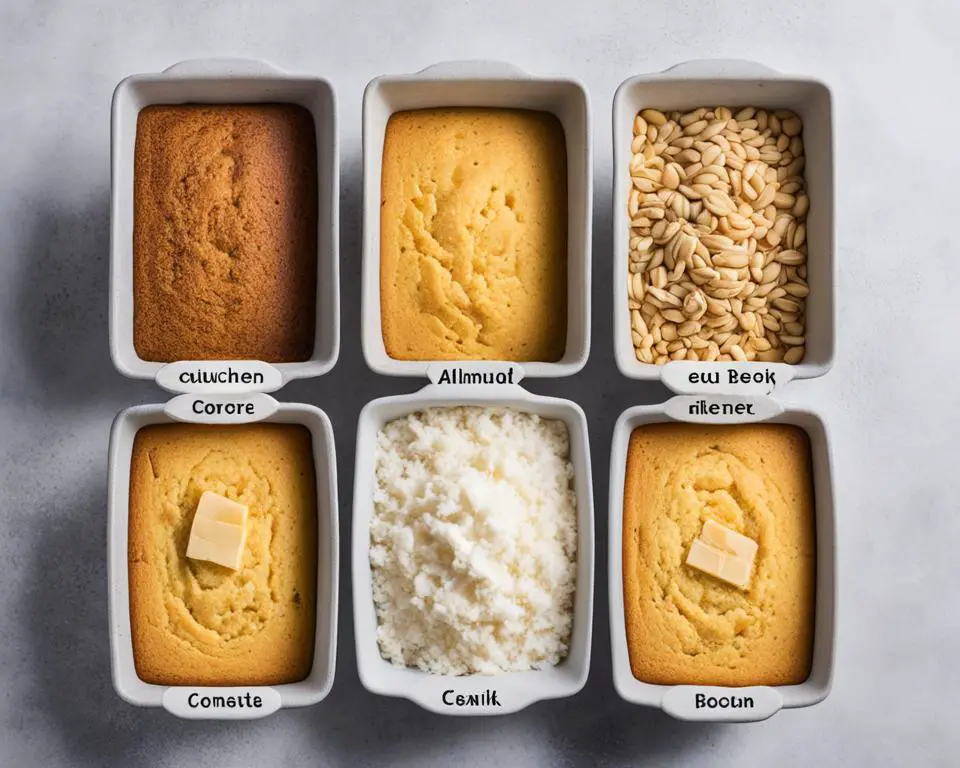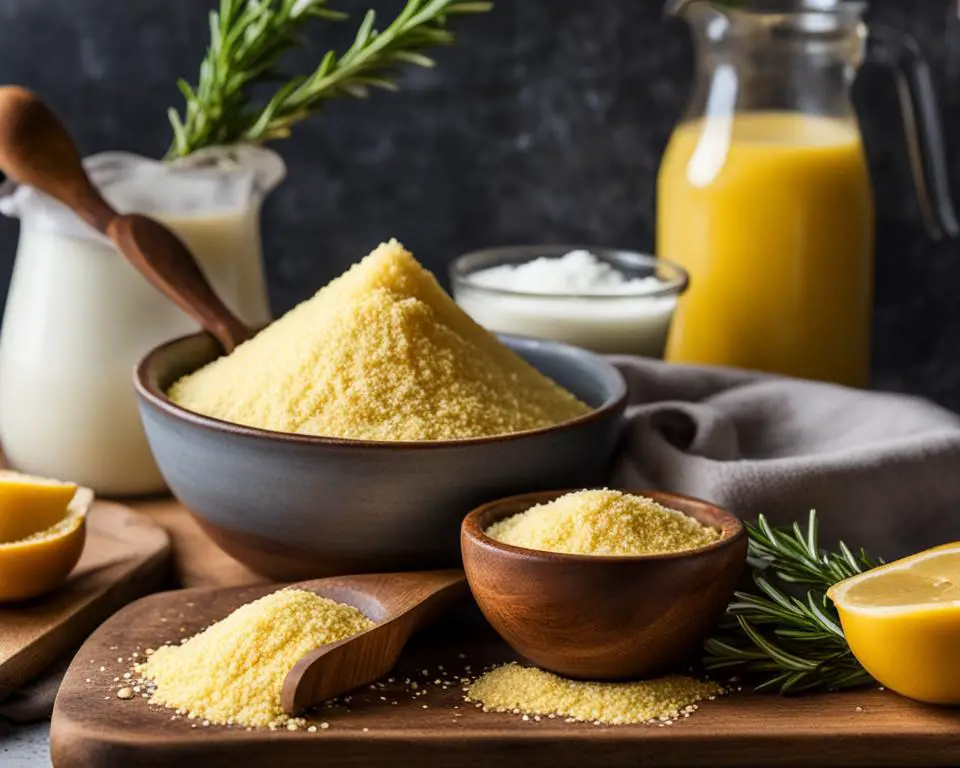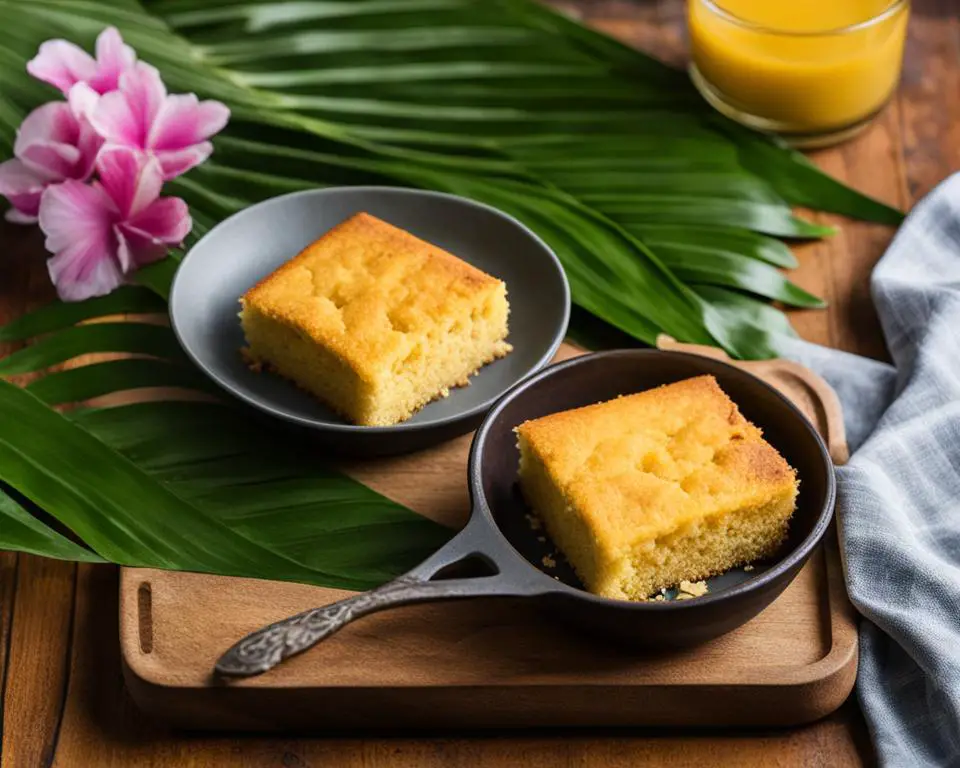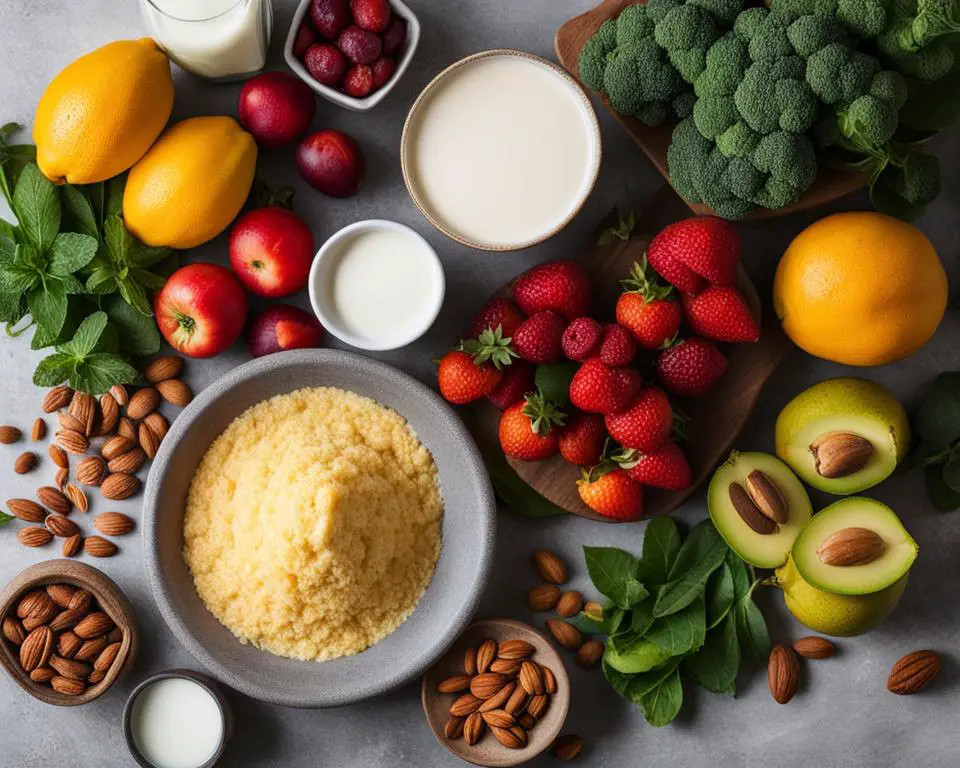If you’re looking for a dairy-free cornbread recipe or a lactose-free cornbread, this article is for you. In this article, we’ll explore seven ideal substitutes for milk in cornbread and provide you with the right ratio for each substitute to ensure you achieve the perfect texture and flavor in your cornbread.
Cornbread is a classic comfort food enjoyed by many, and with a few simple substitutions, it can be made to accommodate different dietary needs and preferences. Whether you prefer a plant-based alternative or looking for allergy-friendly substitutes, we’ve got you covered.
Read on to discover the many options available for substituting milk in cornbread without compromising on taste or texture.
Non-Dairy Milk Substitutes for Cornbread
If you’re looking for a non-dairy option for your cornbread, there are several plant-based milk alternatives that work perfectly in cornbread recipes. Not only do these substitutes provide a delicious taste and texture to your recipe, but they also offer health benefits, as many contain essential vitamins and minerals.
Some of the best non-dairy milk substitutes for cornbread include:
| Milk Substitute | Ratio |
|---|---|
| Coconut Milk | 1:1 |
| Almond Milk | 1:1 |
| Soy Milk | 1:1 |
You can use these alternatives for dairy-free cornbread, making it ideal for individuals with lactose intolerance. Besides, if you’re looking for a healthier option for your cornbread, these substitutes are perfect as they contain less saturated fat and fewer calories compared to dairy milk.
In addition, non-dairy cornbread can be an excellent option for vegans. When selecting a milk alternative for cornbread, consider the type of recipe you’re making and the flavor you want to achieve. For example, coconut milk can add a unique tropical twist to your cornbread, while almond milk provides a nutty, subtle flavor.
Experiment with these substitutes and ratios to find your perfect combination and make your non-dairy cornbread stand out. These alternatives are easy to find in most grocery stores or make at home, making it easier than ever to enjoy delicious, healthy, non-dairy alternatives to cornbread.
Lactose-Free Options for Cornbread
If you’re lactose intolerant or following a dairy-free diet, you don’t have to miss out on enjoying delicious cornbread. Fortunately, there are several lactose-free substitutes that work well in cornbread recipes.
One option is to use lactose-free milk, which has the same texture and taste as regular milk without the lactose. You can substitute an equal amount of lactose-free milk for milk in any cornbread recipe. It is widely available in supermarkets and dairy shelves.
Alternatively, you can use coconut milk as a lactose-free substitute in your cornbread. Coconut milk adds a sweet, nutty flavor to your recipe and can make your cornbread extra moist. Try using an equal amount of coconut milk as you would regular milk.
If you prefer a dairy substitute besides milk, you can use vegan butter in place of regular butter for lactose-free cornbread. In addition, olive oil or other vegetable oils can be used instead of butter or milk to make your cornbread moist and tender.

Lactose-Free Substitutes for Cornbread
| Substitute | Quantity | Benefits |
|---|---|---|
| Lactose-Free Milk | 1 cup for 1 cup of regular milk | Same texture and taste as regular milk |
| Coconut Milk | 1 cup for 1 cup of regular milk | Adds a sweet, nutty flavor and extra moisture to the recipe |
| Vegan Butter | Same quantity as regular butter | Great butter substitute for lactose-free cornbread |
| Olive Oil or Vegetable Oil | Same quantity as regular butter or milk | Make your cornbread moist and tender without dairy products |
Using these lactose-free substitutes can help you enjoy delicious cornbread without any discomfort or compromising taste. Do not hesitate to experiment with different recipes, ratios, and options to find the best combination for you.
Vegan Cornbread Substitutions
If you’re following a vegan diet or looking to incorporate more plant-based ingredients into your cornbread, there are plenty of dairy-free options available that will maintain the delicious taste and consistency you expect. Here are some substitutes for milk that are perfect for vegan cornbread recipes:
| Substitute | Ratio to Milk |
|---|---|
| Coconut Milk | 1:1 |
| Almond Milk | 1:1 |
| Soy Milk | 1:1 |
| Oat Milk | 1:1 |
These substitutes are widely available and easy to find at most grocery stores. You can use any of the above-mentioned substitutes in your cornbread recipe, depending on your preference. You can also combine different non-dairy milk alternatives to create unique flavors and textures.
Here are some delightful vegan cornbread recipes that you can try at home:
- Cornbread with Green Chiles: Adding green chiles to cornbread adds a hint of spice and depth of flavor to the classic recipe. This vegan cornbread recipe uses almond milk as a substitute for dairy milk.
- Vegan Skillet Cornbread: This recipe uses coconut milk to make a moist and fluffy cornbread that’s perfect for topping with vegan butter or jam.
- Blueberry Cornbread: This vegan cornbread recipe is made with oat milk and incorporates sweet blueberries for a unique flavor combination.
Nut Milk Substitutes for Cornbread
If you’re looking for a dairy-free or lactose-free option for your cornbread, nut milk substitutes such as almond milk can be an excellent option. Almond milk is made from ground almonds and water, giving it a mild nutty flavor that complements the sweetness of cornbread. You can use it as a substitute in a 1:1 ratio for dairy milk, keeping in mind that it may result in a slightly denser texture than traditional cornbread.
Another great option is cashew milk, which has a creamier texture than almond milk. Cashews are high in healthy fats, making it an excellent option if you’re looking for a more nutritious substitute. Use it in the same ratio as almond milk for your cornbread recipe, and you’ll get a tender, moist consistency that can rival any classic dairy-based recipe.
If you prefer a stronger nutty flavor, hazelnut milk can be an excellent choice. Hazelnut milk is rich and creamy, with a taste that pairs perfectly with cornbread. However, keep in mind that hazelnut milk’s flavor can be overpowering; therefore, it’s best used in small amounts. You can use it as a dairy milk substitute at a 1:1 ration, mixing it with other nut milks if needed.

Other nut milk options include pecan milk, which can add a delicious flavor to your cornbread, and macadamia milk, which has a creamy consistency that’s perfect for baking. Experiment with different nut milk substitutes to find the one that best complements your cornbread recipe.
Soy Milk in Cornbread Recipe
Soy milk is an excellent alternative to dairy milk for anyone who prefers plant-based milk in their cornbread recipes. Here are a few things to keep in mind when using soy milk:
- Stick to unsweetened soy milk. Sweetened soy milk can make your cornbread too sweet and alter the flavor.
- Choose a soy milk that has a neutral taste. Flavored soy milk can impact the taste of your cornbread and make it less enjoyable.
- Use the same amount of soy milk as you would dairy milk in your recipe. This will ensure your cornbread retains the same texture and density.
If you are looking for a soy milk cornbread recipe, try this delicious one:
Soy Milk Cornbread Recipe
| Ingredients | Measurements |
|---|---|
| Yellow cornmeal | 1 cup |
| All-purpose flour | 1 cup |
| Baking powder | 1 tablespoon |
| Salt | 1/2 teaspoon |
| White sugar | 1/4 cup |
| Egg | 1 |
| Soy milk | 1 cup |
| Vegetable oil | 1/4 cup |
Instructions:
- Preheat your oven to 400°F.
- In a large mixing bowl, combine cornmeal, flour, baking powder, salt, and sugar. Mix well.
- In another bowl, whisk together egg, soy milk, and oil.
- Pour the wet ingredients into the dry ingredients, and stir until just combined. Do not overmix.
- Pour the batter into a greased 9-inch baking pan or cast-iron skillet. Bake in the preheated oven for 20-25 minutes or until a toothpick inserted in the center comes out clean.
- Serve warm and enjoy!
Using soy milk in cornbread recipe is an excellent alternative for anyone who wants to enjoy a plant-based milk cornbread option. The recipe we shared is just one of many extraordinary ways to incorporate soy milk into your cornbread. Give it a try, and you might find your new favorite recipe!
Coconut Milk Cornbread
If you’re a fan of coconut milk, you’ll love this dairy-free and non-dairy cornbread recipe. Coconut milk complements the natural sweetness of cornmeal and adds a tropical twist to the classic recipe. Below are some recipe tips to make delicious coconut milk cornbread.
| Ingredients | Instructions |
|---|---|
| 1 cup all-purpose flour | Preheat the oven to 375°F (190°C). |
| 1 cup yellow cornmeal | In a mixing bowl, combine the flour, cornmeal, sugar, baking powder, and salt. Stir well. |
| 3 tbsp granulated sugar | In a separate bowl, whisk together the coconut milk, vegetable oil, and egg. |
| 2 tsp baking powder | Pour the wet ingredients into the dry mixture and stir until just combined. |
| 1 tsp salt | Pour the batter into a greased 8×8 inch baking pan. |
| 1 cup coconut milk | Bake for 20-25 minutes or until a toothpick inserted into the center comes out clean. |
| 1/4 cup vegetable oil | Cool for a few minutes before slicing and serving. |
| 1 egg, beaten |
You can also experiment with adding shredded coconut or other tropical flavors such as pineapple or mango to add even more depth to the coconut milk cornbread. Enjoy this unique twist on a classic recipe.

Other Milk Alternatives for Cornbread
Looking for other milk alternatives for your cornbread? Look no further. While non-dairy options like soy and almond milk are popular choices, there are several other substitutes worth exploring. Here are a few plant-based milk substitutes to consider:
| Milk Substitute | Ratio to Milk | Benefits |
|---|---|---|
| Coconut Milk | 1:1 | Pro tip: Coconut milk adds a tropical twist to cornbread and works best in sweet cornbread recipes. |
| Oat Milk | 1:1 | Rich and creamy, oat milk is an economical choice for those on a budget. |
| Rice Milk | 1:1 | Pro tip: Rice milk is a great option for those with nut allergies. |
| Quinoa Milk | 1:1 | High in protein and essential nutrients, quinoa milk is an excellent choice for health-conscious individuals. |
Experiment with different milk substitutes and ratios to find your perfect combination. Remember to consider the flavor and texture of your cornbread recipe, as well as any dietary restrictions or preferences. While some milk substitutes may alter the taste slightly, they can provide added benefits and a unique twist to your favorite cornbread recipe.
Healthy Replacements for Milk in Cornbread
Looking for a healthier alternative to milk in your cornbread? There are several options that can add a nutritious boost without sacrificing taste or texture. Consider trying some of these healthy milk substitutes for cornbread:
| Substitute | Benefits | Ratio |
|---|---|---|
| Coconut Water | High in electrolytes and low in fat and calories | 1:1 (use unsweetened) |
| Green Tea | Rich in antioxidants and can enhance the flavor of cornbread with a subtle tea flavor | 1:1 (brewed green tea) |
| Applesauce | Low in calories and fat, high in fiber and natural sweetness | 1:1 (use plain, unsweetened applesauce) |
| Greek Yogurt | High in protein, calcium, and beneficial bacteria | 1:1 (use plain, unsweetened greek yogurt) |
| Buttermilk | Less fat than regular milk, adds a tangy flavor | 1:1 (combine 1 cup milk + 1 tbsp vinegar or lemon juice, let sit for 5 mins) |
Experiment with these healthy replacements for milk in cornbread and find your perfect combination. Don’t be afraid to try different ratios and ingredients to achieve the desired texture and flavor. And remember, incorporating wholesome ingredients can make your cornbread recipe more nutritious without sacrificing taste.

Allergy-Friendly Alternatives for Milk in Cornbread
For individuals with milk allergies or sensitivities, finding suitable alternatives for milk in cornbread recipes can be challenging. Fortunately, there are various milk-free options that can help achieve the perfect texture and flavor.
Soy milk is an excellent lactose-free alternative to dairy milk and can be used in cornbread recipes. Another option is nut-based milk, such as almond milk, which is also an excellent option for those with dairy allergies.
One other popular choice is coconut milk, which can be a great substitute for milk in cornbread recipes. However, it’s essential to note that coconut is a highly allergenic food, so it’s important to confirm with your physician before using it as a substitute.
If you’re looking for a creamier option, you can use non-dairy creamers made from soy or nut milk. These creamers can add a rich texture to your cornbread recipe without the presence of dairy milk.
| Alternative | Benefits | Ratio (for 1 cup of milk) |
|---|---|---|
| Soy milk | Lactose-free, low fat, and high protein content | 1 cup |
| Almond milk | Low calorie, rich in vitamin E, and nutty flavor | 1 cup |
| Coconut milk | Rich, creamy texture, and tropical flavor | 1/2-3/4 cup |
| Non-dairy creamer | Creamy texture without the presence of dairy milk | 1 cup |
When using these alternatives, it’s essential to keep in mind that the ratio of milk substitute to cornmeal may vary depending on the recipe. It’s best to start with smaller amounts and adjust as necessary to achieve the desired consistency and flavor.
By exploring these allergy-friendly alternatives for milk in cornbread, you can create safe and enjoyable recipes for everyone. Experiment with different options and ratios to achieve the perfect texture and flavor in your homemade cornbread.
Conclusion
In conclusion, using milk substitutes in cornbread recipes opens up a world of possibilities, catering to various dietary needs and preferences. With the right substitutes and ratios, you can achieve the perfect texture and flavor in your cornbread without compromising on taste.
Whether you’re looking for non-dairy, lactose-free, vegan, nut-based, soy-based, or coconut-based substitutes, there are plenty of options to choose from. You can also explore additional plant-based milk alternatives or opt for healthier ingredients in your cornbread.
By experimenting with various substitutes and ratios, you can create cornbread that suits your taste and dietary needs. So go ahead and try out different combinations and enjoy the diversity of flavors in your homemade cornbread.
FAQ
What are some ideal substitutes for milk in cornbread?
There are several ideal substitutes for milk in cornbread, such as almond milk, soy milk, coconut milk, and even water in certain instances. These alternatives provide a similar level of moisture and can be used in the same ratio as milk in most cornbread recipes.
Can I use non-dairy milk substitutes in cornbread?
Absolutely! Non-dairy milk substitutes like almond milk, soy milk, and coconut milk work well in cornbread recipes. They provide a creamy texture and add a unique flavor profile to your cornbread. You can use these substitutes in a 1:1 ratio with milk.
Are there lactose-free options for cornbread?
Yes, there are lactose-free options for cornbread. You can use lactose-free milk or lactose-free milk alternatives like almond milk, soy milk, or coconut milk. These substitutes provide the same level of moisture and can be used in the same ratio as regular milk in cornbread recipes.
Can I make vegan cornbread?
Absolutely! You can make delicious vegan cornbread by using plant-based milk substitutes like almond milk or soy milk. Simply replace the milk in your cornbread recipe with your preferred vegan milk substitute. There are also many vegan cornbread recipes available that use these substitutes.
Can I use nut milk substitutes in cornbread?
Yes, nut milk substitutes like almond milk can be used in cornbread recipes. They provide a creamy texture and a subtle nutty flavor that complements the cornbread. Simply substitute the milk in your recipe with an equal amount of nut milk for delicious results.
Can I use soy milk in a cornbread recipe?
Yes, you can use soy milk in a cornbread recipe. Soy milk works well as a substitute for milk in most recipes, including cornbread. It provides a similar level of moisture and can be used in the same ratio as regular milk.
Can I use coconut milk in cornbread?
Yes, you can use coconut milk in cornbread. Coconut milk adds a rich and slightly sweet flavor to the cornbread, giving it a unique tropical twist. Simply substitute the milk in your cornbread recipe with coconut milk in a 1:1 ratio for a delicious coconut-infused cornbread.
Are there other milk alternatives I can use in cornbread?
Yes, aside from the popular non-dairy milk substitutes, there are other alternatives you can consider for your cornbread. Some options include rice milk, oat milk, and hemp milk. These alternatives provide different flavors and textures, allowing you to experiment and find your favorite combination.
What are some healthy replacements for milk in cornbread?
If you’re looking for healthy replacements for milk in cornbread, try using unsweetened almond milk, oat milk, or even homemade cashew milk. These options provide a nutritious twist to your cornbread while maintaining the desired moisture and flavor.
Are there allergy-friendly alternatives for milk in cornbread?
Yes, there are allergy-friendly alternatives for milk in cornbread. For individuals with milk allergies or sensitivities, you can use substitutes like rice milk, oat milk, or nut milk alternatives such as almond milk or cashew milk. These alternatives allow you to enjoy flavorful and safe cornbread.